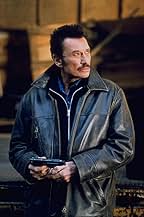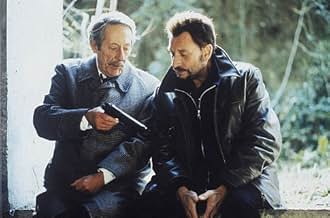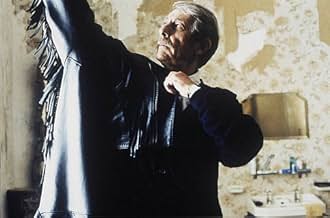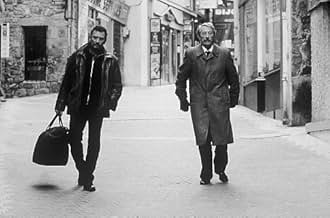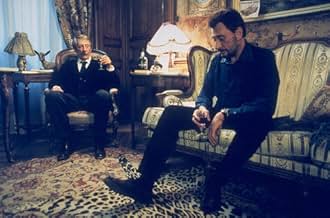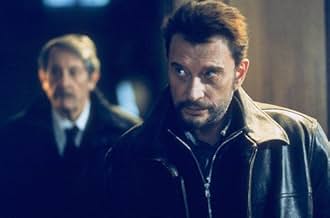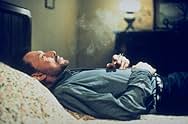AVALIAÇÃO DA IMDb
7,1/10
7,7 mil
SUA AVALIAÇÃO
Um homem desce de um trem em um vilarejo francês, esperando o dia em que roubará o banco da cidade. Ele conhece uma professora de poesia aposentada e começará uma estranha amizade.Um homem desce de um trem em um vilarejo francês, esperando o dia em que roubará o banco da cidade. Ele conhece uma professora de poesia aposentada e começará uma estranha amizade.Um homem desce de um trem em um vilarejo francês, esperando o dia em que roubará o banco da cidade. Ele conhece uma professora de poesia aposentada e começará uma estranha amizade.
- Direção
- Roteirista
- Artistas
- Prêmios
- 8 vitórias e 10 indicações no total
Avaliações em destaque
"Man on the Train (L'Homme du train)" is a small story of cumulative details done exceedingly well that could simply not be done by Hollywood.
The excellent leads, each charismatic in his own way, talky Jean Rochefort and taciturn Johnny Hallyday (who brings none of his pop star baggage to an American audience), are past middle age. There is a lot of Rohmer-like sitting around talking over a bottle of wine.
The emphasis is on very gradual, internal realizations by each character that are revealed by a subtle accretion of surprising little decisions, such as wearing slippers or getting a new haircut, culminating in an unpredictable, yet beautifully satisfying conclusion.
Photographed in a shades of gray palette that is almost in black-and-white, a small town and its interconnections and personalities are beautifully evoked.
The women in their lives are ancillary, which is just as well, as they are not completely believable.
The poetry teacher is too sophisticated to quote John Greenleaf Whittier, but I will, on the theme: "Of all the words of tongue or pen/the saddest are these/It might have been."
The excellent leads, each charismatic in his own way, talky Jean Rochefort and taciturn Johnny Hallyday (who brings none of his pop star baggage to an American audience), are past middle age. There is a lot of Rohmer-like sitting around talking over a bottle of wine.
The emphasis is on very gradual, internal realizations by each character that are revealed by a subtle accretion of surprising little decisions, such as wearing slippers or getting a new haircut, culminating in an unpredictable, yet beautifully satisfying conclusion.
Photographed in a shades of gray palette that is almost in black-and-white, a small town and its interconnections and personalities are beautifully evoked.
The women in their lives are ancillary, which is just as well, as they are not completely believable.
The poetry teacher is too sophisticated to quote John Greenleaf Whittier, but I will, on the theme: "Of all the words of tongue or pen/the saddest are these/It might have been."
European cinema again; again originality, again stuff almost unique that I'm afraid I'll never find something similar. Here, the story about two people, and those two alone, and it is not easy two keep up ninety minutes developing their experiences. You need to have a good eye, pace, and respect for your characters.
These characters are Milan (Johnny Hallyday), a thief; and Monsieur Manesquier (Jean Rochefort), a retired literature professor. Their differences make their encounters scary. One, an old man who likes to talk and is fascinated by this mysterious obscure man in strange clothes; Manesquier enters Milan's room and imagines to be in a fantasy world he couldn't live in.
Milan is quiet and soft talking, but induces the old man into the drinking again, into excitement and adventures; and after meeting his pals he even doubts about carrying on with the only thing he came to do to this town: rob a bank. He reaches the limit of giving a literature lesson to one of Manesquier's pupils.
The camera is in love with them both, and presents each one in an original way when they are on screen. Different colors, postures, followings. Each one might hide something; there's a past, but that's not what this story that wanders through coincidences and casualties of life wants to show.
A simple aspirin, a glass of water; what can that lead to. The anxiety of a man to be part of something he never lived, on one side. On the other side the silence and intrigue of the little conversation. The glasses of wine, the lunches that seem to say much but are saying almost nothing about the characters.
The music, by Pacscal Estève, is very important to the film; giving to it a touch of Westerns style, playing to represent the state of mind and humor of the characters when we see them, or simply, not playing at all; and that's very good sometimes. Ivan Maussion's production design is also a good point for that matter, with his deserted streets and lonely places.
The screenplay results to be cultured and very intelligent. Patrice Leconte's frequent writing collaborator leaves everything in his character's hands; because the words are his. Also frequently cast by Leconte, Jean Rochefort's delivery is impressing in his measured role, that requires little but well done. It's Johnny Hallyday, however, the one who steals, or shines in his loneliness. With all those looks and his face, always full of hidden things.
Metaphors join us again, in the movie; for us to interpret. I tried, and everyone will, but I say: thank Europe for these movies; it's worth and more a kind of pleasure to watch them!
These characters are Milan (Johnny Hallyday), a thief; and Monsieur Manesquier (Jean Rochefort), a retired literature professor. Their differences make their encounters scary. One, an old man who likes to talk and is fascinated by this mysterious obscure man in strange clothes; Manesquier enters Milan's room and imagines to be in a fantasy world he couldn't live in.
Milan is quiet and soft talking, but induces the old man into the drinking again, into excitement and adventures; and after meeting his pals he even doubts about carrying on with the only thing he came to do to this town: rob a bank. He reaches the limit of giving a literature lesson to one of Manesquier's pupils.
The camera is in love with them both, and presents each one in an original way when they are on screen. Different colors, postures, followings. Each one might hide something; there's a past, but that's not what this story that wanders through coincidences and casualties of life wants to show.
A simple aspirin, a glass of water; what can that lead to. The anxiety of a man to be part of something he never lived, on one side. On the other side the silence and intrigue of the little conversation. The glasses of wine, the lunches that seem to say much but are saying almost nothing about the characters.
The music, by Pacscal Estève, is very important to the film; giving to it a touch of Westerns style, playing to represent the state of mind and humor of the characters when we see them, or simply, not playing at all; and that's very good sometimes. Ivan Maussion's production design is also a good point for that matter, with his deserted streets and lonely places.
The screenplay results to be cultured and very intelligent. Patrice Leconte's frequent writing collaborator leaves everything in his character's hands; because the words are his. Also frequently cast by Leconte, Jean Rochefort's delivery is impressing in his measured role, that requires little but well done. It's Johnny Hallyday, however, the one who steals, or shines in his loneliness. With all those looks and his face, always full of hidden things.
Metaphors join us again, in the movie; for us to interpret. I tried, and everyone will, but I say: thank Europe for these movies; it's worth and more a kind of pleasure to watch them!
As we left the theatre someone inevitably said, `that was very French.' And so it was, or at least it was a movie that Hollywood would never have made. Washed-up bank robber meets retired French teacher and they become friends, each hankering after the other's lifestyle. The teacher is facing open-heart surgery, the robber the prospect of a dangerous bank job with three unreliable associates. All this set in a really boring small town in the Rhone Valley (filmed mainly in Annonoy with funding of course from the local Film Commission).
Yet it works. Watching the two principals, Jean Rochefort as the teacher and Johnny Hallyday as the robber is like watching Torvill and Dean perfect synchronisation, but with humour added. There's not a false move and the script is seamless it seems quite inevitable that such an improbable relationship could develop. Somehow we don't notice the improbabilities, such as the gang stealing a huge (by French standards) and rare BMW 740 for use as a getaway car the evening before the robbery from a car park in the centre of town, and making no effort to conceal it until the robbery at 10 heurs the next day.
Perhaps the relationship can be explained on the basis that Jean likes to talk and Johnny is content to listen. As they get to know each other Jean becomes quite concerned about his guest and Johnny, for his part, comes to admire his host. He even upbraids Jean's quite pleasant mistress for boring Jean with talk of her children's misdemeanours.
The film ends in a flurry of `maybe things might have been different if '. You can choose the alternative ending you like in fact, though the fantasy is more palatable that reality. Unlike Hollywood, French filmmakers trust their audience, and it is unlikely too many viewers will feel cheated here.
Yet it works. Watching the two principals, Jean Rochefort as the teacher and Johnny Hallyday as the robber is like watching Torvill and Dean perfect synchronisation, but with humour added. There's not a false move and the script is seamless it seems quite inevitable that such an improbable relationship could develop. Somehow we don't notice the improbabilities, such as the gang stealing a huge (by French standards) and rare BMW 740 for use as a getaway car the evening before the robbery from a car park in the centre of town, and making no effort to conceal it until the robbery at 10 heurs the next day.
Perhaps the relationship can be explained on the basis that Jean likes to talk and Johnny is content to listen. As they get to know each other Jean becomes quite concerned about his guest and Johnny, for his part, comes to admire his host. He even upbraids Jean's quite pleasant mistress for boring Jean with talk of her children's misdemeanours.
The film ends in a flurry of `maybe things might have been different if '. You can choose the alternative ending you like in fact, though the fantasy is more palatable that reality. Unlike Hollywood, French filmmakers trust their audience, and it is unlikely too many viewers will feel cheated here.
1st watched 8/9/2003 - 7 out of 10(Dir-Patrice Leconte): Wonderful drama about two men who want to switch places in life because each is bored of what their life has become. One is a bank robber, and the other is a retired poetry teacher. The bank robber is plain tired of the excitement and the other wants excitement in his life. The retired poetry teacher also has an upcoming triple-bypass heart surgery that lends to his aggressiveness about trying out the other lifestyle. Like many French dramas, this movie takes it's time and explores the characters and let's us get to know them. This is `so' lacking in most American films these days and therefore this is a breath of fresh air for those who are okay with reading subtitles. While watching this movie you get the feeling that you're watching two `real' people interacting despite their differences. Do they ever switch places? Well, sort of but like other French dramas `reality' is where the film stays for the most part. The ability for the characters to understand and accept each other is `just' wonderful and makes a wonderful statement about how we should `all' interact and I think this is what makes this film remarkable.
This movie must be seen! Too many people think about French films as too slow, boring and too "intellectual". L'Homme du Train is the opposite: ironic, funny without being obvious or foreseen. Two protagonists and a director: a perfect alchemy between the three.
Leconte uses the camera "inside" the characters, Rochefort and Hallyday are superb in their roles. Moreover everyone can identify with one of the two: everyone dreamt at least once to be someone else! Leconte makes the dream true!
Leconte uses the camera "inside" the characters, Rochefort and Hallyday are superb in their roles. Moreover everyone can identify with one of the two: everyone dreamt at least once to be someone else! Leconte makes the dream true!
Você sabia?
- CuriosidadesJean Rochefort died in October 2017. Two months later, Johnny Hallyday died.
- ConexõesReferenced in 69 minutes sans chichis: Johnny Hallyday (2015)
- Trilhas sonorasImpromptu in A-flat Major, Op. 142 No. 2 (D. 935)
Written by Franz Schubert
Principais escolhas
Faça login para avaliar e ver a lista de recomendações personalizadas
- How long is Man on the Train?Fornecido pela Alexa
Detalhes
- Data de lançamento
- Países de origem
- Central de atendimento oficial
- Idioma
- Também conhecido como
- Man on the Train
- Locações de filme
- Empresas de produção
- Consulte mais créditos da empresa na IMDbPro
Bilheteria
- Faturamento bruto nos EUA e Canadá
- US$ 2.542.020
- Fim de semana de estreia nos EUA e Canadá
- US$ 41.138
- 11 de mai. de 2003
- Faturamento bruto mundial
- US$ 7.727.906
- Tempo de duração
- 1 h 30 min(90 min)
- Cor
- Mixagem de som
- Proporção
- 2.35 : 1
Contribua para esta página
Sugerir uma alteração ou adicionar conteúdo ausente


